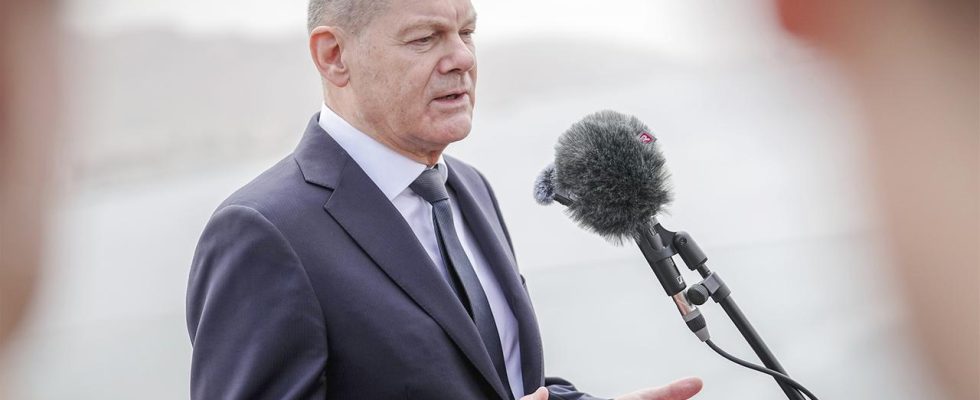Chancellor Scholz was last in the Middle East in October, shortly after the Hamas terrorist attack on Israel. Now he is in the region again – with clear messages and warnings.
Federal Chancellor Olaf Scholz is in the Middle East for the second time since the beginning of the Gaza War. He urgently called for a ceasefire. “It is very clear that we must now do everything we can to ensure that the situation does not become even worse than it is,” said the SPD politician after a conversation with Jordan’s King Abdullah in Aqaba, with a view to a possible Israeli ground offensive in the south of the Gaza Strip. “I believe that a large number of victims in such an offensive would make any peaceful development very difficult. Many in Israel also know that.”
In Israel on Sunday, Scholz also wants to speak with Israel’s Prime Minister Benjamin Netanyahu, President Izchak Herzog, Minister Benny Gantz and relatives of hostages. Immediately before the meeting, Netanyahu made it clear that he was committed to a military operation in Rafah on the border with Egypt and was firmly opposed to an end to the Gaza war before all Israeli goals had been achieved.
“If we end the war now before its goals are achieved, it means that Israel has lost the war,” said the head of government. This will not be allowed. “No amount of international pressure will prevent us from achieving all the war goals,” Netanyahu said. Israel wants to destroy Hamas, secure the release of all hostages and ensure “that the Gaza Strip no longer poses a threat to Israel.”
Aid organizations warn of many civilian deaths
The war was triggered by a terrorist attack on Israel by the Palestinian Hamas on October 7th. Israel wants to destroy Hamas and free the hostages from the control of the terrorist organization. It is believed that around 100 of them are still alive. Scholz traveled to Israel for the first time ten days after the Hamas attack to assure the country of German solidarity.
The Israeli Prime Minister approved the controversial ground offensive in Rafah in the south of the Gaza Strip on Friday. According to estimates, 1.5 million Palestinians are currently seeking protection from the fighting in the other areas of the Gaza Strip in very small spaces and under miserable conditions. Aid organizations warn of many more civilian deaths.
With regard to the possible number of victims, the Chancellor also said: It should not come to this “that many who fled to Rafah in Gaza are now in immediate danger” from military action, warned Scholz. “That’s why I, like the American president, made it very clear that we think that this is something where we have to do everything very, very, very carefully to avoid further large numbers of victims.”
New proposal from Hamas peace talks
With a view to a planned resumption of indirect negotiations on a temporary ceasefire, Scholz said that the goal now was a longer-lasting ceasefire. According to local media reports, Israel’s war cabinet wants to meet with Netanyahu on Sunday to decide whether to send a delegation to Qatar. There, the recently stalled talks on a ceasefire are set to continue in the capital Doha after the Islamist Hamas presented a new proposal to the mediators.
While Scholz met the Jordanian king in Aqaba, the air force was preparing further aid flights almost 400 kilometers away at the “King Abdullah Airbase” near the capital Amman. Germany is thus participating in the Jordanian initiative for an airlift to the Gaza Strip. After the first delivery of four tons of food – including rice and flour – was parachuted from a transport plane over the north of the Palestinian territory on Saturday, the second relief flight took place on Sunday. Several other countries also had transport aircraft in use.
Scholz announced at a press conference that Germany would continue to support the Jordanian army with kerosene. Jordan is seen by many observers as one of the key countries in efforts to moderate the Palestinian side in the current situation. Around 60 percent of the Jordanian population has Palestinian roots. It also has good relations with Israel while also managing Islam’s third holiest site – the Al-Aqsa Mosque in Jerusalem.
With information from Tilo Spanhel, ARD Studio Cairo
Tilo Spanhel, ARD Cairo, tagesschau, March 17, 2024 2:05 p.m

